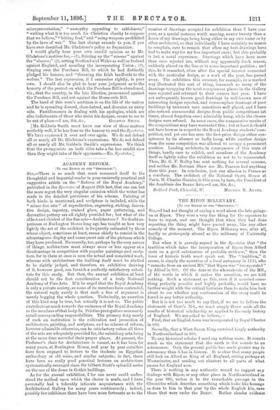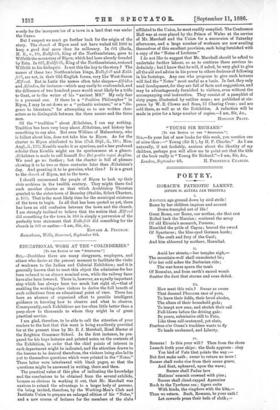THE RIPON MILLENARY.
[To THE EDITOR OF THE " SPECTATOR."]
Sin,—I had not thought of saying a word about the late goings- on at Ripon. They were a very fine thing for the reporters to have to report, and one thought that when they had done reporting, the thing might have passed away, like any other comedy of the moment. The Ripon Millenary was, after all, hardly so grotesquely absurd as the millenary of University College.
But when it is gravely argued in the Spectator that "the tradition which dates the incorporation of Ripon from Alfred rests on a good substratum of probable evidence," then the lover of historic truth must speak out. The " tradition," it seems, is simply the assertion of a local antiquary in 1733, who " remarks from an ancient MS." that Ripon was " incorporated" by Alfred in 886. Of the date or the whereabouts of the MS., of the words in which it makes the assertion, we are told nothing. Such a statement as this, even if it asserted some- thing perfectly possible and highly probable, would have no further weight with the critical historian than to make him look about to see whether any confirmation of the story could be found in any better authority.
But it is not too much to say that, if we are to believe the statement of Gent's MS., we must simply throw aside all the results of historical scholarship as applied to the early history of England. We are asked to believe,—
First, that an English town was incorporated by Royal Charter in 886.
Secondly, that a West-Saxon King exercised kingly authority in Northumberland in 886.
To any historical scholar I need say nothing more. It sounds much as the statement that the earth is fiat sounds to an astronomer. Only the general public has made greater way iu astronomy than it has in history. It is clear that many people still look on Alfred as King of all England, sitting perhaps at Westminster, and sending out charters to all parts of what passes for England now.
There is nothing in any authentic record to suggest acy dealings with Ripon, or any other place in Northumberland in the year 886, unless it be the remarkable passage in the Chronicles which describes something which looks like homage as done to him in that year by the whole English kin, save those that were under the Dane.. Rather slender evidence
surely for the incorporation of a town in a land that was under the Danes.
But I suspect we must go further back for the origin of the story. The church of Ripon need not have waited till 1886 to keep a good deal more than its millenary. In e61 (Breda, H. E., v., 19), Ealhfriih, King of the Northnmbrians, gave to WIlfrith the monastery of Ripon, which had been already founded by Eata. In 687, Ealdfrith, King of the Northumbrians, restored Wilfrith to his bishopric. Is not this the key to the story P The names of these two Northumbrian kings, Ealkfrit and Eald- friS, are not, in their Old-English forms, very like West-Saxon "Elf-red. But in Latin the names often take shapes—Alfridus and Afredua, for instance—which may easily be confounded, and the difference of two hundred years would most likely be a trifle to Gent, or to the writer of his " ancient MS." My only fear is a personal one. If there be a "Positive Philosopher" in Ripon, :I may be set down as a " pedantic nuisance," or a "dis- grace to literature," for attempting so to use written char- acters as to distinguish between the three names and the three men.
Of the " tradition " about .2Ethelstan, I can say nothing. Tradition has been very busy about lEthelstan, and history has something to say also. But even William of Malmesbury, who is fullest about him, does not take him to Ripon. As for the charter to Ripon attributed to him (Cod. Dipl., ii., 185; Mon. Angl., ii., 133). Kemble marks it as spurious, and a less profound scholar than Kemble might see its spuriousness at a glance. IEthelstan is made to call himself Rex Dei gratia regni Angliae. We need go no further ; but the charter is full of phrases showing it to be two or three centuries later than lEthelstan's day. And granting it to be genuine, what then P It is a grant to the church of Ripon, not to the town.
I should recommend the people of Ripon to look up their civic archives in the twelfth century. They might there find such another charter as that which Archbishop Thurston granted to the sister-town of Beverley (Stubbs, Select Charters, p. 105). That is the most likely time for the municipal existence of the town to begin. In all that has been quoted as yet, there has been an odd confusion between the town and the church. I am strongly inclined to believe that the notion that zElf-red did something for the town in 886 is simply a perversion of the perfectly true statement that Ealh-fri'S did something for the church in 661 or earlier.—I am, Sir, &c.,



































 Previous page
Previous page